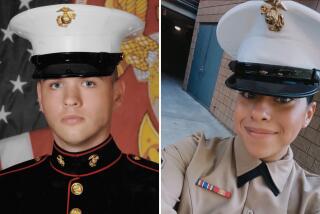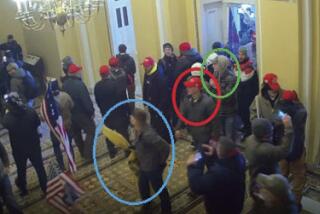Ex-Marine testifies at squad leader’s court-martial in Iraqi deaths
- Share via
Reporting from Camp Pendleton — A former Marine testified Tuesday that he and other Marines were justified in breaking into a home in Iraq and killing everyone inside after their squad leader told them the house was to be treated as “hostile.”
Stephen Tatum, testifying under immunity, said that after their superior, Staff Sgt. Frank Wuterich, labeled the home “hostile,” there was no need to ask questions to distinguish between combatants and noncombatants before killing those inside with M-16 fire and grenades.
Tatum, 30, who left the Marine Corps as a corporal and now works for an oil company in Oklahoma, gave his account on the second day of Wuterich’s court-martial on charges of manslaughter, assault and dereliction of duty.
On Nov. 19, 2005, Marines from Wuterich’s squad killed 24 Iraqis in the village of Haditha after an insurgent bomb left a fellow Marine dead and two others injured.
Tatum said that immediately after the explosion, he heard several rounds of small-arms fire coming from the direction of a home about 200 yards away but was not sure of its origin.
“I never saw an individual firing,” he said under questioning by a prosecutor.
After he, Wuterich and two other Marines burst into the home, Tatum said, there was no requirement to determine if people inside were noncombatants.
“I did not feel I had to [positively identify] individuals” as threats, he said.
Wuterich had been given an order by a lieutenant to “clear” houses near the site of the explosion.
Tatum testified that he saw Wuterich firing his M-16 in a room where the bodies of women and children were later found — an assertion defense attorneys have said they will disprove.
In opening statements Monday, prosecutors told jurors that Wuterich lost control of himself and led his squad on a vengeful rampage without determining whether people inside three nearby homes were actually threats.
A defense attorney, in his opening, said Wuterich led his men in accordance with Marine training on how to clear houses being used by insurgent gunmen. The deaths of noncombatants, the attorney argued, was a tragedy but not a reason to bring criminal charges.
Tatum said that once inside the first of the houses, he heard the sound of someone preparing to fire an AK-47 assault rifle. Wuterich was inside, firing his weapon and hurling grenades, he said.
“The only thing that gave me the idea that there was hostile intent [on the part of residents] was Staff Sgt. Wuterich firing,” Tatum said. A search later turned up no AK-47s, which are often used by Iraqi insurgents.
Wuterich took the lead in the assault, Tatum said: “He was muzzle up and ready to engage any individuals coming out of those two doors.”
Once the Marines started firing and throwing grenades, the smoke and dust made it impossible to tell the age or gender of targets, Tatum testified. “They were just silhouettes,” he said.
Defense attorney Neal Puckett asked the former Marine if he felt that he or Wuterich had done anything wrong.
“No, sir,” Tatum said without hesitation.
Although Wuterich was on his first combat deployment, Tatum was a veteran of the battle in Fallouja, the bloodiest urban fighting involving Marines since Vietnam.
Clearing houses in Fallouja had taught him not to hesitate, he said. “I’m trained to shoot two to the head, and two to the chest and I followed my training,” he told an investigator from the Naval Criminal Investigative Service.
Eight Marines were charged in the Haditha incident: four enlisted Marines on charges of killing the Iraqis and four officers on charges of not doing a thorough investigation when it was learned that no insurgents were found and that the dead included three women and seven children.
Charges were later dismissed against six of the Marines, including Tatum. One officer was found not guilty at a court-martial. The battalion commander was forced into retirement, although charges against him were dropped.
At Tatum’s preliminary hearing in 2007, a hearing officer recommended dismissing the charges. But the general acting as the convening authority sent the case to court-martial, which ended in a plea bargain with the charges dismissed in exchange for Tatum’s testimony against Wuterich.
“I believe [Tatum’s] real-life experience and training on how to clear a room took over and his body instinctively began firing while his head tried to grasp at what and why he was firing,” the hearing officer wrote in his recommendation.
More to Read
Sign up for Essential California
The most important California stories and recommendations in your inbox every morning.
You may occasionally receive promotional content from the Los Angeles Times.












